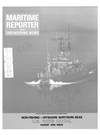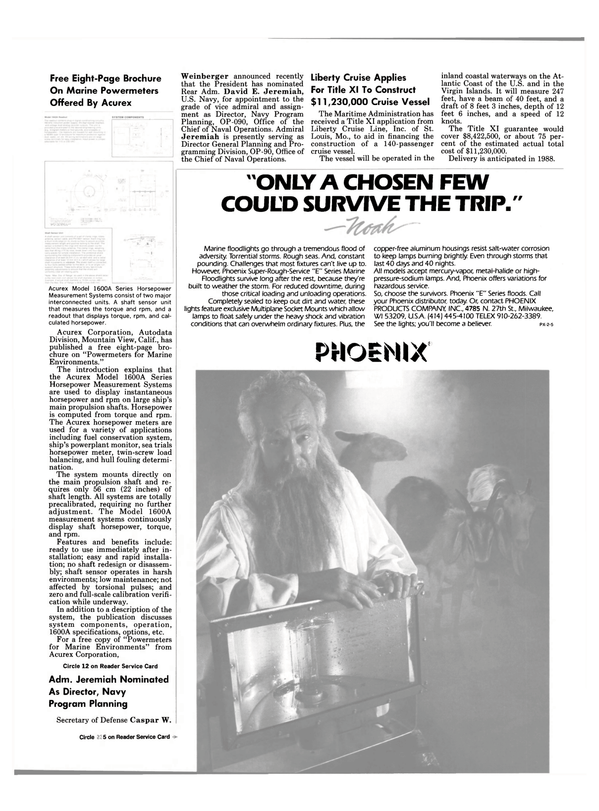
M.A.N.-B&W Offers Cost-Saving Systems For Their MC Engines —New Brochures Available
With their line of MC engines well-established in the marine industry, M.A.N.-B&W Diesel A/S is now focusing on the continuing expansion of their engine program and its application possibilities, including the use of turbo compound systems, which have kept pace with the increased specialization in the shipbuilding sector.
The current range of M.A.N.- B&W two-stroke engines comprises three variants of long-stroke engines— the K-MC, L-MC and SMC.
As a new feature which will expand opportunities for the application of MC-engines, a special version designated the MC-GI, is now being introduced. The MC-GI engine (GI stands for gas injection) will, through the application of a unique high pressure gas injection technology, enable the use of natural gas and other combustile gases in the engines at outputs and thermal efficiencies identical to those of current heavy fuel burning MC-engines.
This system, which has been demonstrated in operation on a full scale 35MC engine and approved by the classification societies, now represents an economically attractive propulsion alternative for LNG carriers and for stationary power plants.
Realizing that the engine process itself needs only a certain turbocharger efficiency, the high efficiency of the latest versions of the turbochargers (M.A.N. NA/TO and BBC VTR-4A) makes it possible to obtain even lower fuel consumption by utilizing part of the exhaust gas in a Turbo Compound System (TCS).
The TCS comprises a gas turbine which is driven by an exhaust gas by-pass. The turbine can be connected mechanically to the main engine front end, via a gear box. The "surplus" exhaust gas is therefore utilized by by-passing the turbocharger and using it to drive a gas turbine unit, thus producing mechanical energy. The power obtained is fed back to the main engine, thereby reducing the fuel oil consumption at the same output power.
According to the company, when a TCS unit is installed, savings of up to 5 g/bhph can be obtained, and based upon an oil price of $170 per ton, means a savings of approximately $50,000 for every 10,000 bhp per 250 days of operation.
Another cost-saving product offered by M.A.N.-B&W is the PTO—power take-off—which is a generator driven by the main engine via a hydraulic frequency control box (RCF—Renk Constant Frequency) mounted on the side of the main engine for producing electrical power for a ship.
The company maintains that up to $23,000 worth of fuel oil and maintenance can be saved for every 250 days in operation, when a 550- kw PTO unit is used on a 5L70MC engine at 80 percent mcr (based on a fuel oil price of $170 per ton).
M.A.N.-B&W also is offering a system which combines the use of both PTO and TCS called PTO/ PTI.
For free color brochures, catalogs and additional information on MC engines, Circle 45 on Reader Service Card For further information and a free color brochure on TCS, PTO and PTO/PTI, Circle 46 on Reader Service Card
Read M.A.N.-B&W Offers Cost-Saving Systems For Their MC Engines —New Brochures Available in Pdf, Flash or Html5 edition of August 1986 Maritime Reporter
Other stories from August 1986 issue
Content
- MacGregor-Navire Announces Key Appointments page: 4
- New Repair Yard Under Construction In Southern Chile For ASMAR & Partner page: 6
- Yamazaki New President Of Sumitomo Machinery page: 6
- Auxiliary Rescue Salvage Vessel Commissioned At Peterson Shipyard page: 7
- NOR-FISHING '86 Trondheim, Norway, August 11-16 page: 8
- McDermott Shipyard Lays Dredge Keel page: 10
- Valmet Testing Newly Developed Ducted Propeller For Icegoing Vessels page: 10
- Wiismuller Salvage And Offshore Tugs Inc. Form New Company page: 11
- Bethlehem's Sabine Yard Busy With Drill Rig And Ship Dockings page: 12
- Fleet Oiler Construction At Penn Ship Adds To Beginning Of A New Era page: 12
- Cummins Diesels Selected To Repower Research Vessel Calypso page: 14
- Nichols Brothers Yard Delivers Luxury Catamaran Cruise Vessel page: 14
- AMERICA'S SEAPORTS The Dynamics Of Change page: 16
- AAPA's 1986 Annual Convention Set For Miami page: 22
- New Intertanko Publication— 'TANKER PORT PARTICULARS 1986' page: 25
- Ameroid DC Disc Cleaner Approved For Cleaning Westfalia Disc Stacks page: 25
- Bollinger Named Chairman Of Louisiana Shipbuilding And Repair Association page: 27
- Navy Selects Ingalls For Planning Reactivation Of Battleship Wisconsin page: 27
- Newport News Shipbuilding And SNAME Sponsor Ship Production Symposium page: 28
- M.A.N.-B&W Offers Cost-Saving Systems For Their MC Engines —New Brochures Available page: 29
- Honeywell Marine Systems Division Restructures Marketing Organization page: 30
- Free Eight-Page Brochure On Marine Powermeters Offered By Acurex page: 31
- ONS '86 SHOW AND CONFERENCE ATTRACTING STRONG INTEREST FROM EXHIBITORS page: 32
- Daewoo-Built Vehicle Carriers To Have MacGregor-Navire Access Equipment page: 35
- Fairbanks Morse Engine Division Ships First Colt-Pielstick PC4.2 page: 36
- Stable Offshore Platforms Planned By Navy For Aircraft Training Exercises page: 36
- Gear Rating Discussed At Joint Meeting Of ASNE And SNAME Sections page: 36
- New Fuel Consumption Monitoring System From Kockumation page: 36
- Tacoma Boat Launches Ocean Surveillance Ship For Navy's MSC page: 37
- Baldt Marks 85th Year As Major Supplier To Marine/Offshore Industries page: 37
- Workboats Northwest Yard Delivers High-Speed Fireboat To Ketchikan page: 38
- SI Introduces 'First Family' Of Survival/Exposure Suits page: 38
- Tidewater Marine Upgrades Another Towing/Supply Vessel At McDermott page: 39
- Magnus Maritec Named Exclusive Marine Supplier Of Ethysorb products page: 40
- Marinette Marine Launches First In Yard Patrol Boat Series page: 40
- Captain Wages Joins MSI As Director Of New Simulator Training Center page: 40
- Newfoundland-Sweden New Joint Venture Company page: 40
- Ward Leonard Electric Offers Free 10-Page Push Button Catalog page: 41
- Hydrostatic Drives Propel Many New 'Old-Time' Paddlewheelers page: 42
- Hyster Expands XL Line Of Lift Trucks page: 45
- Conrad Shipyard Delivers Unique Drydock To Republic Of Venezuela page: 45
- Shipmate's RS-6100 Navtex Receiver page: 49
- Offshore Production And Test Ship Delivered By NKK To Norwegian Owner page: 49
- Microprocessor-Based System Monitors/Controls Mooring Lines page: 50
- Moss Point Marine Completes Tug For Panama Canal Commission page: 50
- New 12-page Catalog On Multi-Port Ball Valves Offered By Pittsburgh Brass page: 50
- Bay Shipbuilding Progressing With Construction Of Sea-Land Containerships page: 55
- Moss Point Marine To Build Multipurpose Boat For U.S. Agency page: 55


